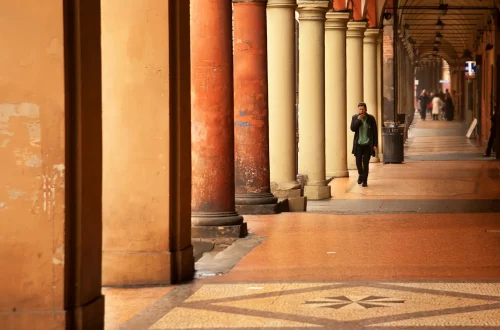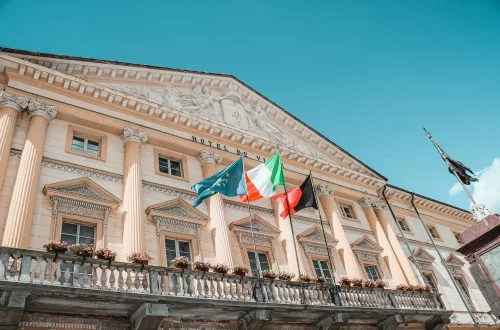The Italian Consulate General has been in Chicago since October 1st, 1981. It is situated on the 18th floor of 500 North Michigan Ave., a high-rise building built in 1968, just in front of the Tribune Tower along the Magnificent Mile. The consulate’s main functions include services related to citizenship, passports, visas, and general assistance to Italian nationals.
Services offered by the Italian consulate in Chicago
The consulate provides various services to assist the local Italian community and individuals of Italian descent. Let’s explore some of the key offerings services:
- Passport issuance and renewal: Italian citizens can apply for and renew their passports at the consulate. This service ensures that Italian nationals can travel freely and maintain their legal identification. The process involves providing personal documents, such as proof of identity and residency, and undergoing biometric data collection.
- Visa services: The consulate handles visa applications for those wishing to travel to Italy for tourism, work, study, or other purposes. Applicants must submit various documents, including proof of travel plans and financial stability, to obtain the appropriate visa.
- General assistance: The consulate assists Italian citizens in various situations, such as legal issues, medical emergencies, and other critical needs. They provide support in times of crisis, offer information on legal rights and obligations, and facilitate communication with local authorities if necessary.
- Citizenship services: The consulate processes Italian citizenship applications for those within its jurisdiction. Its official website provides detailed guidelines for citizenship applications.
Challenges in scheduling appointments at the consulate
One of the common challenges faced is the difficulty in scheduling appointments due to high demand. This issue is particularly pronounced for those seeking citizenship services, as these appointments are in high demand.
The COVID-19 pandemic has further complicated the situation. Although the consulate is working to manage the backlog and accommodate as many applicants as possible, the restrictions imposed by the pandemic continue to pose significant challenges.
Take advantage of specialized assistance to secure your passport for a borderless future.
Timeframes and bureaucracy involved in consular processes
Applying for Italian citizenship through the consulate can be a lengthy and bureaucratic process. The estimated average processing time for citizenship applications via the traditional consular method can range from several months to a few years, depending on the complexity of the case and the volume of applications being processed.
One of the main reasons for delays is the stringent documentation requirements. Applicants must provide extensive proof of their eligibility, which may include birth, marriage, and death certificates spanning several generations, proof of residency, and other legal documents. These documents often need to be translated into Italian and authenticated with an apostille. Any errors or missing documents can lead to significant delays, further complicating the process.
Italian citizenship requirements
To obtain Italian citizenship, one must satisfy certain eligibility requirements, which differ based on the citizenship type sought.
- Citizenship by descent (Jus Sanguinis): This is available to individuals who can prove their Italian ancestry. The key requirement is demonstrating an unbroken line of Italian citizenship through birth records, marriage certificates, and other legal documents from their Italian ancestors.
- Citizenship by marriage: Non-Italian citizens married to an Italian citizen can apply for citizenship. They must be married for at least two years if residing in Italy or three years if residing abroad. This period is reduced by half if the couple has children together.
- Citizenship by naturalization: This route is available to foreigners who have legally resided in Italy for a certain period, usually ten years. Applicants must demonstrate good conduct, sufficient income, and proficiency in the Italian language.
Alternatives to the traditional process: judicial route considerations
Due to the challenges associated with the traditional consular process, many applicants are considering the judicial route as a viable alternative.
The judicial route involves filing a case in an Italian court to obtain citizenship. This method can be particularly appealing for those facing significant delays or complications in the consular process. The judicial route allows applicants to bypass some of the bureaucratic hurdles and directly address their case through the legal system.
One of the main benefits of the judicial route is the potential for shorter processing times. Court cases can often be resolved more quickly than administrative processes, providing applicants with a faster resolution. Additionally, the judicial route may involve less bureaucracy.
However, while the judicial route can offer faster processing times and less bureaucratic red tape, it is also important to consider the costs involved. Legal fees for court cases can be substantial, and applicants should weigh these against the potential benefits. Overall, the judicial route can be a more efficient and less frustrating alternative for those who meet the necessary criteria and can afford the legal expenses.
Take advantage of specialized assistance to secure your passport for a borderless future.
What are Italian citizenship assistance services?
For readers interested in exploring their Italian heritage and obtaining Italian citizenship, considering specialized consulting services can be highly beneficial. Companies like io.citizen offer comprehensive support throughout the entire process, from initial consultation to final approval. Our expertise can help navigate the complexities of both the consular and judicial routes, ensuring a smoother and more efficient experience. Contact io.citizen today and take the first step towards obtaining your Italian citizenship with confidence and ease.






